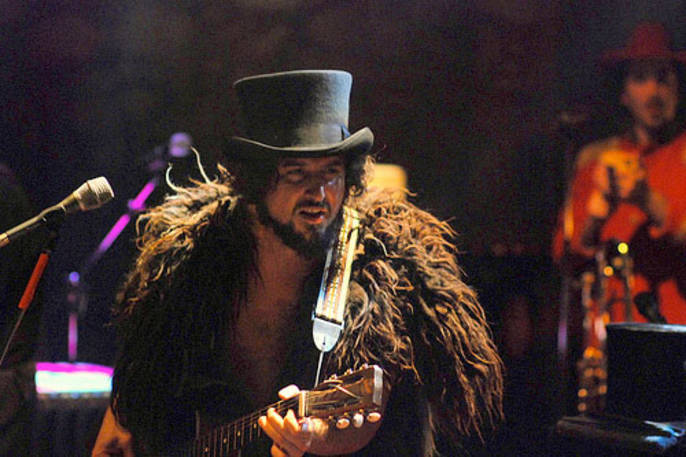


“The Italian minotaur is back in town,” Vinicio Capossela announced after playing “Brucia Troia,” the opening number of his July 2 concert at the Highline Ballroom in Manhattan.
Slipping off the horned mask and full-length furry robe he dons to perform the mythological rocker, the 43 year-old singer, songwriter, and self-described “enchanter” gazed out at the largest audience he’s ever had in New York. His last two shows here were at Joe’s Pub, an intimate downtown venue. This time he brought his idiosyncratic tunes and theatrical sensibility to a mid-sized Chelsea rock club, and filled the place.
The move up to a larger house certainly augurs well for Capossela, and perhaps for new Italian music, which thus far has made limited inroads on the American pop scene. Capossela, Sicilian singer Carmen Consoli, the pop band Avion Travel, from Caserta, and the Milanese rock quintet Afterhours have played club shows and even major rock festivals like South by Southwest in the past few years, earning strong reviews and building enthusiastic, albeit modest-sized followings.
Capossela’s Highline concert was intended to expose him to a larger audience and in that respect it succeeded. But the show itself disappointed. The fans who stood and cheered will no doubt disagree, but the evening, if not exactly a missed opportunity, was not the triumph it should have been. The performance never built momentum or caught fire; though there were strong moments, overall it felt desultory, at times even flat. The sound mix didn’t help, either. Capossela’s voice and piano generally came through fine, but the other band members, on upright bass, drums, saxophones, laptop, and guitar, sometimes were lost in the muddy mix. That’s particularly disappointing when the guitarist is Marc Ribot, one of New York’s most exciting musicians.
The sound mix didn’t help, either. Capossela’s voice and piano generally came through fine, but the other band members, on upright bass, drums, saxophones, laptop, and guitar, sometimes were lost in the muddy mix. That’s particularly disappointing when the guitarist is Marc Ribot, one of New York’s most exciting musicians.
I had just heard Ribot two nights earlier with the band Italian Doc Remix at the Italian Culture Institute. At that gig, you could hear – and feel -- every note he played. The first time I caught him with Capossela at Joe’s Pub, he at times stole the show, especially when he unleashed paint-peeling blues leads. Too bad the Highline concert didn’t show off this remarkable player to full advantage.
The Capossela-Ribot collaboration, both onstage and in the recording studio, is one manifestation of the Italian’s longstanding fascination with America and American culture.
Born in 1965 in Germany to parents from Calitri, a small town in Campania, he returned to Italy as a child. Early on Capossela demonstrated a literary bent and an attraction to underground American culture and the myth of the open road, Bukowski and Kerouac his heroes and inspirations. His recordings from the 1990s, with their jazz-cabaret ambiance and exploration of a certain raffish strain of Americana, earned him the sobriquet/marketing tag “the Italian Tom Waits.” So it makes sense that Capossela would team up with Marc Ribot, Waits’ longtime guitarist.
At the Highline Capossela introduced several new, American-themed songs from his forthcoming and as-yet untitled album, recorded in Brooklyn. One, he said, had been inspired by Sherwood Anderson’s 1919 short-story collection “Winesburg, Ohio.” (Capossela’s not the first cantautore to draw inspiration from the literature of the American Midwest. In 1971 Fabrizio D’Andre released Non al denaro, non all’amore, né al cielo, a concept album inspired by Edgar Lee Masters’ “Spoon River Anthology.”) Another new song spoke of “il silenzio d’America.”
Capossela’s new songs may have been inspired by America, but they rarely sounded American. Whether subdued and moody or more extroverted, they came across as unmistakably Italian, and at times Neapolitan, both melodically and emotionally.
Capossela also has an affinity for Italian American culture, something rare among Italian singer-songwriters. Louis Prima, the novels of John Fante (who currently is much in vogue in Italy) and Martin Scorsese’s films all have fed his fertile imagination. (When I first heard Capossela perform “Brucia Troia” at Joe’s Pub, he called himself “a raging bull, like La Motta.”) At the Highline, he played “Agità,” a comic number sung by Nick Apollo Forte in Woody Allen’s film “Broadway Danny Rose.”
As Capossela accurately observed, it’s a “terrible” song, and he disposed of it quickly. He fared better with an exuberant take on the Italian American standby “Eh Cumpari.”
If the Mediterranean and the Mississippi run through Capossela’s music, so does the Caribbean. Two Cuban-flavored numbers, “Che Cos’è L’Amor?” and “Medusa Cha Cha Cha” were highlights. In the latter, Capossela, in a mask, impersonates the serpent-coiffed Gorgon gal, who protests she’s not really a monster, “only a little nervous.” On the bolero “Con Una Rosa” he quoted “Besame Mucho,” but turned the title’s Spanish imperative into “Baciami.” At the song’s conclusion Capossela treated the front rows to a shower of rose petals.
Capossela closed the show with “Ovunque Proteggi,” the title track from his most recent album. His rendition of it at the Highline was Capossela at his best: no costumes, no theatricality, and no insistent eccentricity, just a lovely, heartfelt love song, affectingly performed.
“Everywhere protect/protect me from evil/everywhere protect/the grace of your heart,” he sang tenderly.
For this reviewer, it was the enchanter’s most enchanting moment in a less than magical evening.
Source URL: http://iitaly.org/magazine/focus/art-culture/article/italian-minotaur-in-new-york-city
Links
[1] http://iitaly.org/files/vinicio1215284276jpg